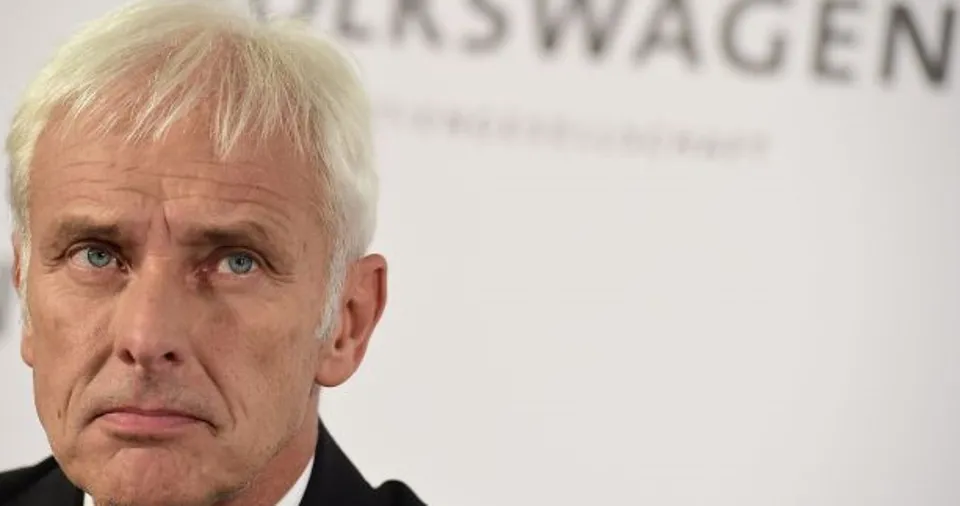Volkswagen has claimed that solid operations were overshadowed by “special items resulting from the diesel issue” as CEO Matthias Müller described 2016 as “a year of transition”.
Despite a positive start to 2016 in which group recorded 2.5 million car deliveries globally – an increase of 0.8% YOY – the Volkswagen Group’s board of management estimated that 2016 sales revenues may fall by as much as 5% on last year at the presentation of the Group’s 2015 annual financial statements today.
Müller said: “2016 will be a year of transition for Volkswagen. Yet it will also be the year in which we accelerate the transformation and lay the foundations for a new, better Volkswagen.”
The group said that it would be opening itself up more to partnerships and equity investments in fields of future importance such as digitalization and mobility services, with e-mobility set to become one of Volkswagen’s hallmarks.
But Müller admitted that working through the diesel issue will dominate activities at Volkswagen during 2016, adding that providing compelling solutions for the customers affected was still the Group’s most important task.
He said: “We stand by our responsibility. And we are doing everything in our power to regain trust.”
The Volkswagen Group delivered 9.9 million vehicles to customers in fiscal year 2015, 2% fewer than in the previous year.
Excluding special items, the Volkswagen Group’s operating profit was on a level with 2014, at EUR £9.97 billion.
But dieselgate led to total exceptional charges of £12.61 billion in 2015, which were recognized in the operating result.
This figure includes provisions for pending technical modifications to the affected diesel engines and repurchases that come to £6.07 billion in total.
Another £5.45 billion has been set aside as a provision for legal risks worldwide.
As a result, the Automotive Division’s return on investment declined by 14.9% during 2015, to –0.2% in the reporting period.
The Volkswagen Group’s statement asserted that its financial situation remained “very favourable”, however, with net cash flow in the Automotive Division increasing by £2.18 billion in 2015 to £6.93 billion.
Net liquidity in the Automotive Division rose to £19.08 (13.7) billion.
This underscores the Group’s sound liquidity policy and gives it the necessary financial stability and flexibility to master the challenges facing it and to grow profitably, it said.
Müller said that the business was “in a good starting position” for its “epochal transformation” with “many strengths to throw into the mix,” reaffirming the goal of playing a key role in e-mobility, with the Volkswagen Group planning to launch over 20 additional models by 2020.
He added: “Our goal is to make the Volkswagen Group more efficient and faster, more entrepreneurial and courageous, more sustainable and technologically more progressive. That is without question an enormous task, but we are making good progress.”
Reporting on the profitability of its individual car brands, the Volkswagen Group said that Volkswagen had generated sales revenue of £82.7 (77.71) billion in 2015, an increase of 6.5% year-on-year.
But operating profit before special items fell to EUR 1.64 (1.95) billion.
At £45.48 (41.89) billion, Audi’s sales revenue exceeded the prior-year figure by 8.6%, due mainly to the positive unit sales growth.
Amounting to £3.97 (4.05) billion, the operating profit before special items was just behind that of the previous year.
The brand generated an operating return on sales of 8.8 (9.6) percent. The diesel issue led to special items of £232 million, however.
ŠKODA’s sales revenue in 2015 was up 6.2% year-on-year at £9.73 (9.19) billion.
Volume and mix effects as well as lower material costs and positive exchange rate effects were said to have lifted the operating profit to £712.50 (636.19) million. The operating return on sales increased to 7.3% (7.0).
In 2015, SEAT generated sales revenue of £6.7 (7.7) billion.
The operating result showed a marked improvement, rising to –£7.79 (–98.89) million. This was primarily due to the higher sales volume, positive exchange rate effects and cost optimization.
In fiscal year 2015, Bentley generated sales revenue of £1.48 billion, up 10.9% on 2014.
Operating profit nevertheless decreased by 34.9% to £85.66 million.
Positive exchange rate effects and cost reductions were unable to compensate for the impact of lower volumes and increased upfront expenditures for new products were blamed for the dip which resulted in an operating return on sales of 5.7% (9.7).
The Porsche, meanwhile, was celebrated as a Volkswagen Group success story in 2015.
At £16.74 (13.39) billion, sales revenue exceeded the prior-year figure by 25.2%.
Operating profit also improved by 25.2 percent to £2.65 billion.
Stringent income and cost management were said to have helped counteract the negative effects from the changes in the mix, increased structural costs and higher development costs for future projects and technologies, and kept the operating return on sales stable year-on-year at 15.8%.
Comment
Frost & Sullivan program manager Shwetha Surender:
“While the emission scandal has taken a toll on the Volkswagen group, the 2015 earnings report indicates that the company is in a fairly strong position despite the financial hit it has taken.
“Although unit sales declined by around 2%, revenue saw a 5% increase, growing to €213.3 billion.
The outlook for the rest of 2016 is quite positive, supported to a large extent by strong sales in China, Volkswagen’s biggest market, and Western Europe.
“In the short to mid-term, Volkswagen’s revamped strategy has put the company on a path to recovery.
“It is working towards rebranding itself as a sustainability provider by increasing the focus on the electrification of its portfolio.
“Modularity continues to form the cornerstone of their operations with the MEB (Modular Electro Toolkit) platform underpinning this shift.
“This will allow the company to be more responsive to market demands.
“The first batch of MEB cars are expected to be launched by the end of the decade. Additionally, Volkswagen is working towards expanding their SUV portfolio; every segment is likely to have an SUV derivative which will help drive sales, particularly in Europe and emerging markets.
“In line with other key OEMs, Volkswagen is also making the move into mobility services and will look to monetise this shift through digitisation and connectivity.
“It has increased its diesel gate provision to €16.9bn.
“In the event, that greater outflow is required to deal with the affected diesel engines, repurchases and legal risks, the hard measures initiated have improved their financial liquidity will serve it in good stead.”














Login to comment
Comments
No comments have been made yet.